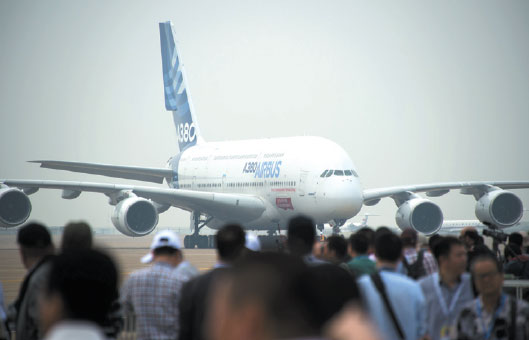Competition to add value of experience, say HR experts
A hot topic at this year's China Airshow, which comes to an end on Saturday, was the growing need for human resources in the aviation industry in China.
Airbus Group Inc, the parent company of Airbus SAS, signed a cooperation agreement with Tsinghua University at the six-day 10th China International Aviation and Aerospace Exhibition held in Zhuhai, Guangdong province, and it is the latest addition to the group's global university partners in 11 countries.
The two sides aim to build up longterm cooperation in areas such as co-developing training courses and supporting the university's diversity.
"It is very high-level and strategic cooperation," said Philippe Pezet, Airbus Group's vice-president and regional human resource director for China and East Asia.
The European aerospace and defense corporation already has partnerships with other Chinese universities and schools for talent development.
"The partnerships help the universities understand what the industry needs, and they are also good for us to better understand how the students are educated," Pezet said.
Although the aviation industry is not a particularly labor-intensive industry, the demand for human resources, especially people with experience, is expanding.
By the end of 2013, China's civil aviation had 2,145 registered aircraft, an increase of 204 on the year before, according to the Civil Aviation Administration of China.
"China has a good pool of talent and the supply of young people is enough, but it is a challenge finding enough experienced people," Pezet said.
There are around 1,080 Airbus aircraft and over 100 helicopters flying in China at present and the number keeps increasing.
The group needs more professionals to manage and maintain its fleet in China, but the airlines here also want them, Pezet said.
"The experienced human resources market is very competitive in China," he added.
Some aircraft manufacturers are training the people they and their clients need themselves.
Bell Helicopter Training Academy received part 147 facility organizational approval from the CAAC, which means it can conduct theory and practical training in China for its 206,407,412 and 429 helicopters.
"The demand for qualified pilots and mechanics continues to grow in China and Bell Helicopter is working to meet that demand," said Ray Lamas, general manager of the academy's global customer training department.
However, the aviation industry also needs to pay more attentions to the long-term stability of its human resources.
The average turnover rate in China was 16.3 percent in 2013, according to Zhaopin.com, China's largest online recruiting company.
"I think about it every day," said Philippe Pezet from Airbus, "Fortunately, we have a much lower turnover rate than the country's average level."
The turnover rate for the Airbus Group in China is only around 7 percent, Pezet said, and one of the key reasons for this is the company invests in its employees.
"Our people are involved with the company and develop with it," he said.
The company has policies and tools to encourage its employees' loyalty, such as success sharing and internal job vacancies.
"Sometimes the company even offers free shares to excellent employees so they become part of the company," Pezet said.
wangwen@chinadaily.com.cn
|
An Airbus A380 stands on the tarmac before taking off at the Airshow China 2014 in Zhuhai on Tuesday. Johannes Eisele / AFP Photo |



















